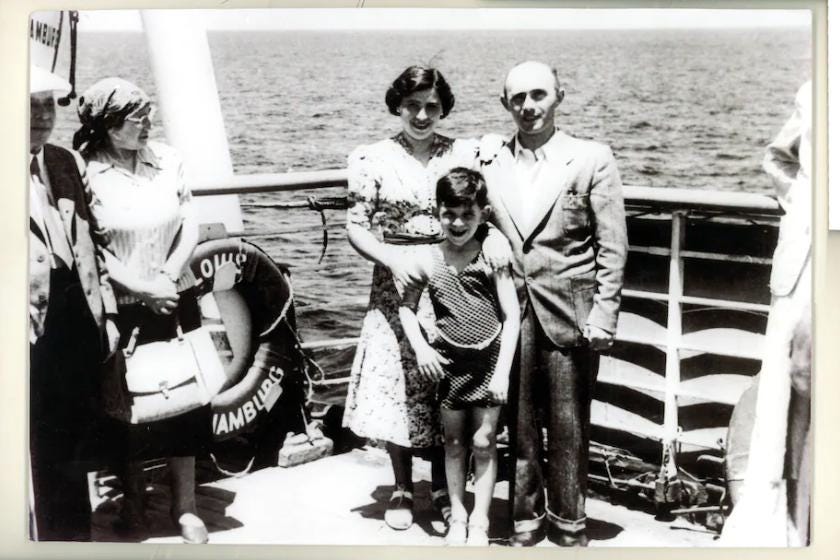Hollywood & Entertainment Ken Burns’ Intense Examination Of ‘The U. S. And The Holocaust’ Shows Why What Transpired 80 Years Ago Is Incredibly Relevant Right Now Anne Easton Contributor Opinions expressed by Forbes Contributors are their own.
I write about original content on all platforms Following New! Follow this author to stay notified about their latest stories. Got it! Sep 18, 2022, 04:18pm EDT | New! Click on the conversation bubble to join the conversation Got it! Share to Facebook Share to Twitter Share to Linkedin Members of the Messinger family aboard a ship in 1939, carrying nearly 1,000 Jewish refugees fleeing . .
. [+] Nazi Germany/ The ship was denied entry into several countries, including the United States. It eventually returned to Europe, where many of the passengers would die in the Holocaust.
(Courtesy of PBS) According to award-winning filmmaker Ken Burns, “The Holocaust is still going on. It is like an amputated limb that is still felt, still aches, still itches, still pains us to this day” This is why Burns has created his latest piece for PBS PBS , a three part, six‑hour series entitled The U. S.
and the Holocaust. Given that Burns and his team began work on the project in 2015, the prolific filmmaker is surprised but how much the finished product resonates today, explaining, “We’ve always had our minds focused on telling the story, and [are] always confident that once it’s done, it will be resonating; it will be echoing in the present. What is so, perhaps disturbing but perhaps illuminating, is the fact that this is, in almost every sentence of this story, resonating in a very fraught and very complicated and very fragile present moment.
” Lynn Novick, who serves as director/producer on the series, adds, “It’s been very eerie to see the echoes of the past echoing louder and louder and louder throughout the time that we made the film. The resurgence of anti-Semitism and white supremacy and racism and hate speech, that have been sort of on the fringe, moving toward the mainstream, while we’re making the film, has made our relationship to the material, and the story we’re telling, and the kinds of questions we’re asking, just get sort of louder and more powerful for all of us. ” Daniel Mendelsohn, author of Lost: A Search for Six of Six Million , who worked behind the scenes and appears on camera in the documentary, says that, “people who watch this film will be able to connect the dots in a very powerful way.
And without belaboring the point, I think it’s pretty clear, and I think that people will see in this film, make it very clear that these kinds of things happen, and they keep happening; they are happening. ” He believes that, “something the film does is give you a sense [that], these are people like us; they are no different. That’s very important to keep in mind, [because] people, then, said, ‘Oh, it’s never going to happen.
’ These are the conversations we’re, right now, having around dinner tables, right? So, draw your own conclusions. But I think the dots are connectible. ” MORE FOR YOU ‘Dune’ Tops Foreign Box Office With Promising $77M Cume ‘Shang-Chi’ Box Office: Marvel Movie Tops $360M Worldwide 4 Series Coming To Netflix In October That Are Worth The Binge As for the tone of the series, Sarah Botstein, director/producer, says, “We’re constantly calibrating when we’re making our films to tell the history, to tell the story, to make it emotional, to make it interesting, to make it personal, and I think you can hold sadness and anger at the same time.
” Speaking about this topic, Mendelsohn feels, “I would say I don’t feel the film is angry, but I feel the film should make you angry, and I personally admired this sort of coolness with which this unbearable material is presented. And, again, I think it’s about making the audience angry and, again, connecting the dots. You know, if you can’t get worked up about this, then there is a problem.
” What really makes Mendelsohn irate, he says, is that, “some of [those people] would have been alive today. And the reason they’re not alive, is because the United States of America basically did its absolute utmost to make it as difficult as possible for Jewish refugees to escape the maelstrom that was engulfing them. ” He speaks of, “the families that were never were created, the children that never were born, the stuff that was never produced in the world, and that’s still with us.
” Because of this, Mendelsohn feels strongly that while this is an event that happened 80 years ago, “the Holocaust is still taking place, because we still feel the ripples that ripple out, even in the year 2022. ” This is where the film plays another key role, says Burns. “There is an element of this film that’s very important.
It’s a bearing witness. You have to keep bearing witness, telling these stories. It may not make the pain go away, but it’s good to feel that you can push back a tiny bit in whatever way you can.
” ‘The U. S. and the Holocaust’ premieres on PBS Sunday, September 18th.
Check your local listings for exact air times. Follow me on Twitter . Anne Easton Editorial Standards Print Reprints & Permissions.
From: forbes
URL: https://www.forbes.com/sites/anneeaston/2022/09/18/ken-burns-intense-examination-of-the-us-and-the-holocaust-shows-why-what-transpired-80-years-ago-is-incredibly-relevant-right-now/
